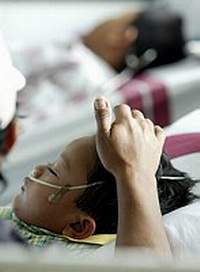Rat urine sends thousands to hospitals in Indonesia's Jakarta
Waters in Indonesia's flood-hit capital have receded, but Dr. Kristiono is busier than ever, moving from bed to bed in a cramped tent set up outside his overcrowded hospital for patients suffering from diarrhea, dengue fever and other waterborne illnesses.

"I've never seen anything like it," he said, pointing to a row of babies on intravenous drips, many of them sick after their parents used tap water infected with E. coli bacteria in their formula. "They just keep coming in."
Seasonal downpours this month caused rivers to break their banks in Jakarta, a sprawling metropolis of 12 million people, covering more than half the city with black, putrid water, waist- and neck-deep in some low-lying slum areas.
At least 97 people either drowned or were electrocuted in the capital and neighboring Banten and West Java provinces, and 38 others have since died of waterborne diseases with health experts warning that the numbers are likely to climb.
Hospitals are grappling with 1,500 flood victims, and experts say there remains a potential for an epidemic of mosquito-borne diseases now that monsoon storms have largely stopped, because pools of water make perfect breeding grounds.
"When it's getting quiet and you have water bodies there without lots of movement, then the eggs start hatching," said Kroeger Axel, a dengue research coordinator for the World Health Organization in Geneva, adding, however, that it "is difficult to predict."
Nearly two-thirds of the flood patients citywide are suffering from diarrhea, which unlike vector-borne diseases, strikes very quickly in the rainy season. Some septic tanks burst during the floods, contaminating water that has since been bottled and resold for drinking. There have been 20 deaths so far.
Doctors and nurses made their way slowly through wards packed with wailing babies and listless children in hardest-hit Koja Hospital, where up until a week ago beds were lining the corridors.
After coming under fire for failing to put in place essential flood control measures, the government provided tons of emergency relief and set up massive air-conditioned tents outside the building.
"He started having stomach problems last weekend," Unayah said of her 6-month-old son Tamin in one of the makeshift wards. "He was hot, he was crying. I brought him here as soon as he started having diarrhea."
"So far they've treated us very well," she said, adding that all care and medication related to flood-related illnesses has been free. "Many people are angry, but I feel very lucky to be here."
Estimates of those made homeless during the height of the Jakarta floods reached more than 400,000, but almost all have returned to their homes, some of them without electricity and tap water, especially in poor neighborhoods.
Sporadic rains continue, and garbage mixes with dark pools on the road, but the deluges seen in the first half of the month have largely ceased.
In recent days, doctors have reported 135 cases of the rare but often-deadly bacterial disease leptospirosis, five of whom have died, the AP reports.
The disease, caused by water contaminated by rat urine, often leads to organ failure.
Marsudi, 39, who lay sleeping on a cot in the hallway in Tarakan hospital packed with other patients, arrived Tuesday, his eyes red and too weak to walk after four days of high fever, said internist Nazir.
"He's lucky," he said. "Earlier this week we had a patient who died. She got here when it was already too late, the bacteria had attacked most of her organs."
Subscribe to Pravda.Ru Telegram channel, Facebook, RSS!


